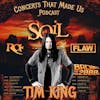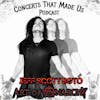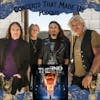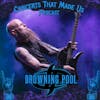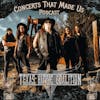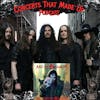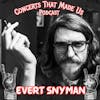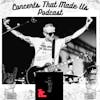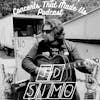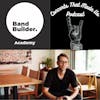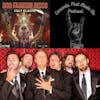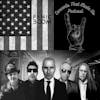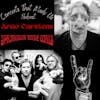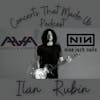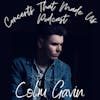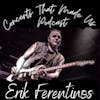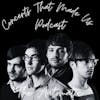
SpeedFreak

On this episode Brian is joined by Kevin from Speedfreak.
Chicago Metal quartet Speedfreak is an institution in the city’s hard rock and metal scene. With a sound that ranges from combative thrash riffs to boozy and bluesy sludge grooves, Speedfreak promises to be the cause of your next hangover. Lauded by Dee Snider as “having great songs” and “f*cking fearless”, the Chicago four-piece has a resume to match their intensity, having played at top notch venues such as Metro, Double Door, Reggies, Chop Shop and The Forge and opened for acts like Helmet, Crowbar, Mothership, Texas Hippie Coalition, Raven, Kill Devil Hill, and Shadows Fall.
Find Speedfreak here:
https://www.facebook.com/speedfreakrock/
https://www.instagram.com/speedfreakmetal/
https://twitter.com/SpeedfreakMetal
https://www.tiktok.com/@speedfreakmetal1
https://www.youtube.com/@speedfreakmetal891
Find CTMU here:
https://linktr.ee/Concertsthatmadeus
Newsletter: https://concertsthatmadeus.aweb.page/p/f065707b-2e34-4268-8e73-94f12bd2e938
If you would like to support the show you can do so by rating/reviewing us on Itunes and Spotify or by signing up at https://www.patreon.com/Concertsthatmadeus
Save 10% on Band Builder Academy membership by following this link https://bandbuilderacademy.com/Brian_Concerts/join and using promo code "concerts" at signup.
Become a member at https://plus.acast.com/s/concerts-that-made-us.
Hosted on Acast. See acast.com/privacy for more information.
Brian: Kevin, you're very welcome to concerts that made us.
Kevin: Yeah, thank you for having me.
Brian: It's great to have you now. I'm looking forward to diving into your music for the next bit. We opened the show with Fastlane Living, the title track of the last album you guys released. What a song. I mean, it kind of makes me want to hop on to a motorbike and like cruise down the highway at like 100 miles an hour. It's like good old fashioned rock and roll, you know.
Kevin: That is exactly what we're going for. That's, uh, that is our music to a T. That's, that's what it's all about.
Brian: I thought so. So what's the story behind the album then? Where did the inspiration come from?
Kevin: So we, uh, you know, we live here in Chicago, the band, the four of us. And we, for a couple of years, we rented a house together and we just lived and worked and rehearsed in this house. Uh, and we did a lot of partying as you can imagine. And so that was kind of the mindset when we wrote Fast Lane Living. That's really what it was all about. We, you know, in our twenties, you're young, partying hard, having a good time, living hard. So that's kind of where the inspiration for the record came from.
Brian: Right, right. And what does it look like when you guys have to make new music? What's the process look like?
Kevin: So we were pretty good about rehearsing regularly. And so, you know, the four of us get in a room together and we'll start jamming. Uh, and just kinda, it's, it's a very collaborative process. You know, every once in a while I'll come up with a riff and bring it to the table or somebody else to come up with a, you know, a riff for, uh, lyrics or something. But for the most part, it's pretty collaborative. Um, we don't ever really sit down and think like, I'm going to write a song about this. You know, usually it just, it's very organic. It just kind of happens.
Brian: Yeah. Yeah. And as well, I have to congratulate you on the awesome award winning video for Doomsday Advices. It's one hell of a video. And you know, even without the music, it's entertaining. It won the award for best metal music video at the Audio Shoot International Musician Video and Film Festival in Wexford, Ireland. First off, that's a mouthful. And that's actually my hometown. Who came up with the idea for entering the video into festivals? It's not something you hear from bands quite often.
Kevin: No, not at all. So the guy who directed that video is a very good friend of the band. His name is Zane Rarick. He's a Chicago filmmaker and you know, he's a guy that we hang out with a lot. He's, he's a friend. And so we, when we first recorded the record, uh, he got ahold of that song and was thinking like, he kind of came up with that idea and he thought it'd be funny to kind of play off that doomsday devices as like that, you know, 1950s sort of red scare, you know, nuclear scare kind of thing. So he really came up with that. And then because he's a filmmaker, you know, he showed us the video. We loved it. We thought it was hilarious. And then he was like, Hey, you know, do you mind if I entered this video on some, some film festival stuff? And we were like, nah, of course, man, you know, not thinking that anybody would ever care about a video from. some Chicago metal band, and then it started winning awards. So I'd love to take credit for that. I don't do anything in that video besides, you know, play my guitar and look like a doofus. That was all Zane Rarick, hats off to him.
Brian: Man, it's gonna be a hard act to follow. Are you going to continue going down the route then of entering your music videos into festivals?
Kevin: I would assume so, assuming that we, you know, the next one we make, I don't know what it's gonna look like, but. If it's funny, if it's cool, then I don't see why not, right? I mean, it's a great way to get our music out there and get some recognition for the video guys. So why not? Right?
Brian: Yeah. Exactly. And how has the reaction been from fans and listeners then since you released the video and the album?
Kevin: Uh, weirdly positive. So, um, yeah. So, uh, you know, it feels kind of strange, right? Because. Fast Lane Livin' was a record that we had been working on for a really long time. We had started writing these songs quite a while ago and they'd been on our live set for a while. And then we actually recorded the album all the way back in 2019. We got into the studio at the Andy Lagas and recorded it. And then we did that video in, I think in 2020, like the weekend before the United States shut down with the COVID stuff, like whatever that Saturday was, that's when we filmed the video. And so... It was like we had all this stuff ready to go. We were planning a release and then, you know, as you know, the world kind of shut down. So then after that, once things started to open our drummer actually broke his leg. So that was another couple months where we couldn't really rehearse or play shows or anything. You can't drum with one leg. You can do it with one arm, right? But not one leg. And so, so like by the time then that we actually got to release the record and now that, you know, people are finally starting to hear it and see it. Uh, it's really cool to have people excited about it and want to talk about it and stuff. Um, but at the same time, it's kind of strange cause it's kind of like, Oh yeah. You know, I've been working on this for so long. I, you know, it's, but it's really, it's really cool.
Brian: During that time then with the lockdowns and everything, and then the drummer breaking his leg, it must've been a tough time for the band. How did you guys push through and you know, stay together and stay positive?
Kevin: I mean, it was tough because we didn't really get to rehearse very much. And every couple of weeks or a couple of months, we'd kind of meet up and we'd drop off the, we rent a rehearsal space. So we'd kind of get together, but we were all masked up, staying our social distance, six feet apart, whatever. And it was definitely like, it was tough. And so we, but we kind of made the decision like, look, we wanna do this, we love what we do, we're gonna... ride it out, you know, whatever it looks like, that's what it's going to be. So, but, uh, you know, and then we, you saw lots of bands doing like Zoom covers and stuff, and we didn't really want to do any of that, but it was tough.
Brian: Yeah. I'd say so, the first gig you guys played then after all that most of being like a massive celebration, was it?
Kevin: It was great. So it was, uh, the first gig finally we played after the COVID and our drummer's Forever Deaf Fest, which is a metal festival here in Chicago. We got invited to play on it. And I was thinking about it like I was, as we were rehearsing leading up to that, it had been about two years since we last played a show. And I was thinking like, this is the longest I've ever gone without performing since I was, you know, 13 or something. But it felt so good to finally get up there and... you know, and do it again. And so afterwards it was like, all right, we're back. We want to get back into this. You know, it was a lot of fun.
Brian: Yeah, from all the music you guys have created, if there's listeners listening right now who haven't heard of you guys, what would you say is your defining work? You know, what is it? Where's a good place for them to jump in?
Kevin: Definitely our Spotify. I would say this, this new record, Fast Lane Living. That's, if you want to taste what we're all about, that's That's it. You know, we had recorded some demos and some earlier stuff way back when, but this Fest Lane Living record, that's what Speed Freak is all about for sure. And that's available on our Spotify, our Bandcamp, everywhere.
Brian: Cool, cool. At this stage, I usually like to dive into my guests' history when it comes to music to give the listeners a sense of where you come from. So if you can, can you remember your earliest musical memory?
Kevin: Man, I don't have a specific memory per se, but I grew up in a house where music was always playing. My mom, she's great lady, she loves music. And so when I think about my childhood, I think about like in the background, it was always the Beatles or the Rolling Stones or like old Motown or Janis, even whatever, we always had music playing at home. And so it was just always like a... something that was part of my life. And so as soon as I got old enough, I obviously, once I figured out I couldn't sing worth the damn, I wanted to start playing instruments. And then the first time I heard ACDC was really like when it kind of clicked for me. I heard Highway to Hell and I was like, I couldn't have been any older than nine or 10 or something. But I remember thinking like, this is the coolest. You know? This is awesome. Like this is what it's all about. And then pretty much since then I've been on the, uh, the rock and roll path, but that's kind of how we're, we're all started. It was just, you know, my mom singing and having the radio on at home and. Yeah. It's there.
Brian: Yeah and were your parents very supportive then when you decided to start playing guitar and you wanted to, you know, further it?
Kevin: Oh God, no. I mean, you know, they, they liked that I, uh, They were always supportive of me playing. Like I played in the orchestra at school and they bought me my first guitar after I begged and begged and begged and begged. But it was always like, okay, it's great that you like music but when are you gonna go to college? Why don't you be a doctor? That sort of thing. But now as I'm older and my life is not, I didn't wind up in jail or dead or anything. I don't know, they're pretty supportive of it now. They think it's cool. I talk to a lot of people, I know a lot of people with bad upbringings and I didn't. My parents were great. So I really only have nice things to say about them.
Brian: Good, good. Now I always say your teenage years are very important when it comes to music. You know, you find out what music really appeals to you and through music you almost find your community. So as a teenager, what music were you exposed to by your peers and how do you think it molded you into the musician you are today?
Kevin: Yeah, when I got into high school, when I was a teenager, I was, I had already been pretty hard into like ACDC and kiss and Led Zeppelin and black Sabbath and you know, the band said all the rock guys like. And in my high school, I was one of those kids that you know I grew my hair out and I wore black t shirts and I was definitely trying to look as hard as I could like some kind of rock star. And so. you know, the other people who were like that in high school, we kind of found each other. Tom, our singer, I actually met him in high school. He was another one of those kids. And so once I got into high school, I started to get into, you know, maybe a little bit more of the heavier metal stuff. I really fell in love with motorhead in high school, obviously Metallica, maybe Metallica would have been before high school, but, and then also as I got a little older, you know, I really started to get a greater appreciation for a lot of blues players. Um, and it started to become more about like, Oh, what's like, you know, it's not the heaviest music you could find, but you start really kind of appreciating, you know, some, some of the more intricate stuff. Um, but my, yeah. To answer your question, like the, the music that I found in high school, it was really, it was more of a continuation of the stuff I was already into. Like I said, it was a lot of heavier metal and then it really got me into appreciating like really good guitar playing. Um, and I, in high school, I was also playing in our school orchestra. So at the same time that I was like, you know, ditching class and trying to meet curls and stuff, I was also learning a lot about musical theory and about classic composers. And so it really, I didn't realize it at the time, but I, that really has had an effect on me as I've gotten older as well.
Brian: Yeah. Yeah. I find the blues thing interesting though, cause I find that lots of teenagers, they will pick up a guitar and they'll listen to the heavier stuff, you know, and they just want to trash about on the guitar. But I noticed when you see someone that wants to be serious about the guitar, they kind of get into blues.
Kevin: Like you were saying, it's a lot more intricate playing and all, but those old blues guys, I don't think there's ever going to be a guitar player on their level and so, you know, like I said, I live in Chicago and downtown I work in downtown Chicago, we know a lot of skyscrapers and stuff. And every day when I get off the train on State Street, there's a giant 40 story mural, you know, and it's Buddy Guy, right? Playing the electric guitar. And so to be in Chicago, like, you know, not that there's a huge blue scene anymore, but there's a lot of blues history here. And you got guys like, obviously you got Muddy Waters and Buddy Guy and you know, Robert Johnson had come up here. And so there's, It's just such a part of the, you know, cultural fabric, if you will. But you're right. Like this, the stuff that those blues guys did, even now, even when you think about, you know, you look at these modern like shred guitar players or whatever, and you go back and you look at some of the stuff these blues guys were doing a hundred years ago, 50 years ago, whatever it, it holds up, man. Like you're right. They're incredible players.
Brian: Yeah, definitely. Definitely and you know, speaking of Chicago, what's the local music scene like? I take it there's obviously lots of competition and it's very vibrant at the moment.
Kevin: Yeah. Uh, I'm very, very fortunate to, to live here and be part of this. There's a lot of great music in Chicago. There always has been. And, you know, we have like Lollapalooza is here every year and that's not really my scene, but there's a lot of festivals that come here and every band that goes on tour, Chicago is what. third biggest city in the country. So everybody stops here. So there's always shows happening. There's always stuff going on. And then there's lots of great local venues as well, that'll put on shows. So it's really a great scene to be a part of. When I was younger, we don't really view it as a competition anymore as you get older and more like a collaboration. Like we're all, everybody, you kind of know each other. We're all friends and stuff. But it's really cool to be a part of. And it's nice that, you know, any night of the week, I can go out and find a bar that there's a band playing and check it out. It's really a great, you know, it's a great place to be.
Brian: Yeah, sounds like heaven for a music lover. And as a concert goer then, what concerts would you say have made you?
Kevin: When I was in, I was maybe a sophomore in high school, and I went to see Motley Crue with a friend of mine. And, you know, I like Motley Crue, they're cool, whatever. But that was the first time I'd really seen a show that had, you know, just pyrotechnics and strippers and explosions and like all of this crazy stuff. And that was really like, you know, when I was first exposed to kind of like the theatrical aspect of it. Yeah. So I think about that a lot. And then another earlier concert I saw Kiss and Aerosmith on tour together. And I, you know, that was a lot of fun. Uh, and so this is all what I would have been around, you know, it was pretty young, like maybe between 12 and 15 or something. A lot of those bigger shows were coming through, but. Oz Fest, we used to go to Oz Fest every year when that had come through town, my buddies and I, and that hasn't happened in a long time, but I always loved going to concerts. I mean, it's always cool to see bands play, you know?
Brian: It's funny you mentioned Motley Crue and Kiss. I've seen Kiss myself back in 2008 and I'm seeing Motley Crue for the first time this summer. I think it's the first time they're actually coming to Ireland but Aerosmith will always be one that, you know, the band that got away, you know, I think they played back in 2015 and unfortunately I missed the show and I don't think I'll ever get a chance to see them now again, you know?
Kevin: Yeah. Yeah. And that's the other like that. It's tough to... All your heroes are getting older now, right? And so it's, it's hard. Yeah. The Aerosmith show, this would have been 2001 maybe. And I remember I almost didn't get to go because that the concert was supposed to be in the summer and for whatever the reason it got rescheduled, so they didn't come through Chicago until later in the fall and I remember it was freezing cold and raining and I, you know, my best friend and I went, I think his dad drove us, but the Aerosmith was put on a great show. I mean, they were a lot of fun. Kiss is great too though. You know, you say what you want about Kiss, they're goofy, it's a gimmick, sure. But they put on a fun show, it's supposed to be fun, you know?
Brian: Yeah, exactly. They're masters of their craft, you know, and you won't be bored at the show, that's for sure and rewind to 2016, you and Tom formed a band. Personally, what has the journey been like for you from that point up to now?
Kevin: Well, when Tom and I formed the band, you know, it was like 90% so we could tell girls that we were in a band. As I'm sure most high school bands are, that's a pretty big factor. And so, you know, there was points in time where we didn't really care about playing. We just liked talking about being in a band. But I'd say as we, you know, it made it stayed this constant thing in our lives. And so as you get older, you really appreciate that it's there. And now it's because it's, it's not like a hobby on the side. It's really a passion. It's what we love to do. Right. And it's, it makes everything else tolerable. I can go to work. You know, at any day job, right. And as long as I know that it's a day job, that I had this other thing going on, then it's okay. So it's really, it's something that I'm really thankful for to be able to do this.
Brian: I have to ask then if you didn't start the band, what do you think your outlet would be now?
Kevin: Oh gosh, no idea. I mean, I, uh, maybe I'd be playing in a different band. You know, it's, I'm sure I'd still be playing. I don't think you ever give up loving music. Um, for a brief period of time, uh, I was in a bluegrass band with some friends and that was fun, but it wasn't quite the same as being in speed freak. Um, you know, I just, I needed that. So if it wasn't this band, it'd probably be a different band. I, I can't ever imagine not doing it.
Brian: I see and for any listeners that haven't caught one of your shows specifically, what can they expect?
Kevin: We try and make our live shows of visceral experience, right? Like we, you know, we really try to have fun. And I don't mean that like, you know, we obviously we play, but, but we want to make sure everybody's having a good time. I mean, that's the point it's rock and roll. It's supposed to be fun. You don't want to leave a show feeling depressed or. You know what I mean? Like it's, our mindset is always like, we're going to have a party in the stage and everybody's invited. Like we, you know, we really, we really enjoy what we do. And so if there's something that anybody ever, whoever sees us, you know, takes away, I want them to think like, look, even if his band isn't my style or my favorite band or whatever, those guys definitely have a good time and they're good at what they do. So that's kind of the, you know, the message we want to send out.
Brian: Yeah, yeah and the music is one thing, but how do you guys perfect your stage show? You know, how do you keep on top of your game to give a good stage show, I suppose, your stage presence and everything?
Kevin: It's so our, you know, there's some videos floating around, I'm sure of like our first gigs back in high school and, you know, we were terrified standing behind our microphones and, you know, wide eyed. And I think it's something you just get comfortable with and look, you're there to have a good time. It's okay to, to be loose, you know, and kind of be yourself. And so now, when we rehearse our live set, you know, we'll always kind of map out what we're going to play. But we've been playing together long enough now that it really it's comfortable. So, you know, we'll say like, look, you know, at this show, make sure you mentioned this band we're going to open for our so and so's birthday, or like, thanks to so and so for having us or whatever. But, you know, we never It's just, it's really a comfort thing. Um, and if it looks natural, it's because it is natural. Like you can always tell the bands that try really hard. You know, it's like to sell you on the fact that it's a performance, but, uh, we try and just, just be cool. Have a good time. Like I said, you know, it's rock and roll, right?
Brian: Yeah, exactly. It's funny. I've actually, uh, I've heard of bands that will. videotape their rehearsals and watch it back over and over again, like it's some sort of football game they're trying to pick out problems with and everything and then work on those.
Kevin: We've talked about doing that but it's because we're all sports fans and I think you know maybe once or twice we've tried to like record our rehearsals but then you get so self-conscious being recorded so we start making faces at each other and goofing off. You know, it's really just, you gotta have, you gotta be comfortable and it takes practice. And I think you need to be comfortable with the music that you're playing, right? Like you need to know that it's okay. You know, you can miss a note or miss a chord or start a song at the wrong time, but have enough confidence in yourself and your fellow musicians that you can kind of jump back into it. And I think then with comfort comes that freedom to express yourself.
Brian: Exactly. You guys have played some legendary venues as well. Is there one gig that maybe sticks out as the perfect gig that you like to revisit in your mind?
Kevin: So right before the pandemic happened, this would have been January 2020, we got to play at the Metro, which is just a legendary Chicago venue. You know, I, every band Metallica actually just played at the Metro. They had a secret show here a couple years ago. And it's like a, I don't know if it's a thousand person or 1500 person, you know, kind of theater place. Um, but it, it was really, really, really cool. Finally, after all these years of being in the band to a see your name on the Marquis at the Metro. And then when we walked out on that stage, you know, for the first time in a very, very long time, I got butterflies. I really got nervous. And that was really a special show. And at the time, you know, I, we, nobody had any idea what was coming. So if you had told me like that was the last time we were going to be on stage for 700 days or something, you know, I would have kind of thought you were, you were nuts. Um, but that was really a special night for sure.
Brian: Yeah. Yeah. It sounds like it. And I always flip that around now, not to get too negative, but is there a gig, maybe one of your early gigs you would say is the worst gig experience you've had and how did you deal with it?
Kevin: Oh, yeah, I mean, we've had it, you know, we've had our fair share of bad gigs. The one I mean, I've had strings break on stage, I've had we've had I've fallen over on stage. And, you know, unfortunately, there's been times where maybe we were a bit over served before we played and got a little sloppy. There's two two of them that really bad ones that come to mind. The first one we were playing. at this bar in Chicago, we were opening for a band that was on tour from Canada. They were called the Motor League. And we were, I think maybe my the first or second song, I had said a drink on top of my amplifier and I spilled. I don't know if I spilled it or jumped or what happened. But anyway, the drink poured to the amp, the amp, you know, frizzled out. And so all of a sudden it's just off. And so that was, you know, and then you're like a deer in headlights. That's really scary. And so credit to the guy from the motor league, you know, this headlining band, they actually, he was like, hang on, hang on, show's not over. And he ran out to their van and he brought his amp, you know, brought it in, brought it up on stage and got me set up. That was one of the coolest things I've ever experienced. So I could finish the gig. And then the other thing, I always think about like, you play that first song at a show, right? And when the first song is over, if the audience is into it, you... You kind of exhale, you think like, okay, you know, this is going to be all right. We can do this, whatever. And I remember we were playing a show in a little town called Antioch, Illinois, which is way up on the border between Illinois and Wisconsin in the, in the Midwest, not a big city or anything. And we were playing this gig. And I, you know, to, to some sports bar and we, we get done with the first song and everybody just scares at us. Like we had, you know, like we were mutants or something that you could hear a that was just excruciating because you're up there and you just know that like nobody cares about what you're doing. You know, uh, that was pretty bad. And I think something else weird happened to that show. I want to say like, for whatever the reason, either I spilled something on my jeans or I, or I forgot to, I don't know what the deal was, but I was, I had to play the show in like boxer shorts or basketball shorts or something Something happened. I either forgot or like spilled something on my pants. So I remember standing up there in my shorts like an idiot, you know, that that stick sticks out of my mind. It's just an excruciatingly bad, awful, awful performance.
Brian: Maybe that could have been why they were staring at you. Could have been, could have been.
Kevin: Yeah. And I want to say it was like, for some reason, I want to say it was like a Sunday and it was earlier in the day. Like it just, everything about it just felt weird. And I think we finished our set and we got the hell out of there as fast as we possibly could.
Brian: So how do you guys approach finding gigs and touring nowadays?
Kevin: So we, you know, back, way back when we'd play anywhere, anywhere that asked us, now we're a little bit more strategic about it. Our drummer owns a venue, in Chicago, he manages the LiveWire Lounge. And so he knows a lot of people in the industry. And so if there's a show that comes up that we think we'd be a fun fit for, we'll try and jump on it. Or if we feel like we wanna play a show or we haven't played in a while, we'll do that. And then as far as touring goes, we haven't done any like extensive touring. We've done some kind of local touring around stuff. But later on this summer, we're actually going to be going on the road with Texas hippie coalition. We're going to Seattle and back with them. And that's going to be our, you know, kind of our, our first, it's the first time we've ever gone out that far. Uh, and then I had to swim back. So we're pretty excited, but, uh, yeah, most of it's, you know, unless you're, you're fortunate enough to be working with a great agent or something, it's a lot of word of mouth, a lot of underground, you know, messaging people on Facebook, legwork work to try and set gigs up. So yeah, that's kind of how we do it.
Brian: Yeah. And how do you guys go about getting your music out there then? I know it can be a nightmare for bands when it comes to social media and stuff.
Kevin: Yeah. I mean, social media, you know, we're, we're working with pavement right now, which is great. Um, but besides that, it's always just been social media and that's tough because, you know, I'm, we're all, you know, dudes in our thirties. So none of us are like big social media influencers, so to speak. So it's tough to like get back on Facebook and remember to share and like, and all that stuff. And so that's why we just try and play as much as we can because, you know, somebody sends you to a band to listen to, maybe you listen to it, but if you're at a bar, if you're out and you see a really cool band playing, that's going to stick with you a lot more.
Brian: So when you guys are playing gigs, then what kind of backstage antics do you get up to, if you can tell us.
Kevin: I mean, you know, we like to have a couple of drinks, get a little loose before we play. We have this thing, you know, we always like, we do a little like kind of huddle chant thing, like we're a football thing, put our hands in the middle, you know, champions on three. We don't say champions, but we do some kind of stuff like that. But, you know, usually like. we get to a show and we'll load our gear in and soundcheck or whatever. But what we always try and do then is like, go and meet the other dudes in the other bands, right? Because we, you know, those guys, they know what it's all about. You know, they're usually, they've become some of our closest friends. It's how you meet people and make contacts. And then we usually just like to chill and meet people and have a good time. So nothing super crazy backstage. On stage, we'll do... You know, we're buddies. We like to mess with each other. So the bass player and I, like, you'll always see us, we try and make faces at each other and, you know, stupid stuff like that, but no real crazy pranks.
Brian: Right, right. And, you know, say Saturday night, you play the most epic gig you've played. You know, sold out venue, everything goes perfect. You get home, you get up Sunday morning, it's back to reality. How do you deal with that?
Kevin: Well, I'm sure I'll take a couple aspirin for the hangover. And then if it's Sunday morning and putting on football or, you know, or F1 season. But no, it's tough. It's funny that you bring that up because it is it's weird to come down from that sometimes. And so I, you know, I definitely have to center myself and I definitely have to remember like when I come home, you know, I there's responsibilities. I still have to go to work on Monday. I still have other things to do. You know, I still gotta go grocery shopping or, you know, take the trash out. I mean, it's, it's humbling, right? Like that. Yeah. To get back into the routine. But fortunately, you know, I have a, uh, there's nothing super crazy going on. So I'm usually able to kind of take some time and decompress. Truthfully, I think it's harder for me. like in the day before or the day of a gig, then it is the day after. Like I always, yeah, it's, you know, you get like those pre-show or like if you're, or if you're a football player, something you get kind of like the pre-match like jitters, you know, it's, you get that kind of nervous adrenaline. And so that's tough for me, like, because I'm excited, right? And so once it's over, then I can kind of exhale and, you know, relax. But yeah.
Brian: I think you'd be worried though, if you didn't get that before a gig.
Kevin: Oh, totally. Those nerves are a good thing. Keeps you sharp. Yeah. Once you start taking it for granted, that's when you know you're going to have a terrible gig, right?
Brian: Yeah, exactly. Exactly. And how do you guys measure success then?
Kevin: Uh, I don't know that we, you know, we never, we've never said like, oh my gosh, we got to, you know, sell this many tickets or this many t-shirts, or we got to get this many streams on Spotify. I think we, you know, We just enjoy what we do, right? And so we try and get appreciative of everything that happens. Like I never, we've never gotten a gig and then been pissed because it wasn't a bigger gig or because more people weren't there. You know, we're pretty humble as far as that kind of stuff goes. I mean, obviously we have goals, right? Like we'd like to play more shows and get out there, but it's more so about getting to do it than it is about any, you know, end game or tangible thing at the end.
Brian: Yeah, yeah. And in say 30, 40 years time, when you look back, what do you want your legacy to be when it comes to music?
Kevin: So, I mean, I would like to believe that I really gave it everything I could. Right. When I was a kid or a teenager, you know, I always dreamed about being a rock star. And so I don't ever want to get to the end of my days and then regret not trying harder. You know, Yeah. That is one. The other thing, like my deep down musical dream would be to someday perform at the Super Bowl halftime show. I think that would just be, you know, the coolest thing in the world. And I don't care if I'm a backup musician to some pop star who's probably not even born yet. I think that would just be a lot of fun, right?
Brian: Yeah it actually would. That's a good one. And Before we dive into the last couple of questions, then what are your future plans? Is there, are you working on new music? Is there tours?
Kevin: So we, like I said, we have that, the tour booked with Texas City coalition, uh, later this summer. I think before then we're going to be doing a smaller tour in the, kind of the Midwestern United States. We're going to try and put that together in the next couple of months. Um, and then in the meantime, we are hard at work on new music. We, you know, since the record's been out. We already have, we have songs we were working on that weren't quite ready when we recorded it. We have some, a lot of stuff that's been written since then. So I think, you know, you could be on the lookout for another record from us in the not too distant future for sure.
BrianL Oh, sounds great. Sounds great. And what can people expect from the new record then that's different from the last?
Kevin: Uh, well, hopefully it won't take three years to get out. There won't be a pandemic happening. Um, No, but yeah, we're going to go smooth jazz, smooth jazz all the way now. No more heavy metal. No, it's going to be a, it's, it's definitely going to be a speed freak record. I don't think anybody's going to hear it and be shocked at any kind of massive, you know, genre change or anything like that.
Brian: Right. Right. And we'll dive into the last couple of questions. So if you could see any performer from history in concert for one night only, who would it be?
Kevin: Jimi Hendrix. No question.
Brian: You know, I love the quickness of the response there. You've obviously taught about it before.
Kevin: Absolutely. I mean, it's Jimi Hendrix, you know, it's special. And to think like he's what, he was only 27 when he died, right? He only played, what, a couple dozen gigs? Like he, you know, it's like when you look back in the Beatles, they were only a thing, so to speak, for a few years. And so, and to think like the impact that Jimi Hendrix has had, world on not just the music world. Like you got to think there must have been something, it must have been really special. So if I could choose any performer to see or go back and time to go to any concert, it'd have to be Jimi Hendrix.
Brian: Yeah, I completely understand. And it's weird about like you're saying, the Beatles and everything. It's weird about all those guys back then who, you know, Jim Morrison as well and Janis Joplin, like they were, as you were saying, they were only famous for like two, maybe three years to died and like 60 years later, they're still massively famous. You know?
Kevin: Right. That's crazy. Legendary.
Brian: And if you had to spend 24 hours locked inside a room with any musician from history, then who would it be?
Kevin: Ooh, that's a good question. Since I already said Jimi Hendrix, I'll pick somebody else. I can imagine 24 hours, Jimi Hendrix would be pretty crazy. Mm. Yeah, he'd probably. We probably do acid or something. I don't know. No, if I could spend that time with any musician, oh gosh, maybe Paul McCartney only because, oh, you know what, I'll stop it. I'm gonna say Elton John, because Elton John is such a tremendous songwriter. You know, and even if like the kind of music that I play, right, like Elton John's not writing heavy metal songs, he's a piano ballad guy, but I would just love to know how great songwriters like that, you know, how they get inspired, how they approach songwriting. I mean, instead of like when Speed Freak writes music, you know, it's we write a couple of riffs and we figure out, you know, the order they go in or we'll write a riff around a vocal melody or something. But just to be able to do it at that level that consistently, like it's really a gift. And so I'd love to be in the presence of somebody like that.
Brian: Yeah, yeah, definitely. Like, Okay, I'm going to sit down now and then go on to write like a number one hit and you actually do it. Just being able to pinpoint what it needs, you know,
Kevin: Or like Dolly Parton wrote, uh, Joanne and she wrote that, you know, whatever their song is in, in like the same night. I mean, how is that even possible? You know, maybe, you know what, maybe I'll change my answer. I feel like Dolly Parton would be a great person to hang out with for 24 hours. She's the best. Yeah. Yeah. Who doesn't love Dolly Parton?
Brian: Exactly. She'd have some crazy stories as well. I'd say and the final one, what song would appear on the soundtrack to your life?
Kevin: OOF So if, you know, man, that's a great question. I, if I had to pick a song like to be played at my funeral, I would probably pick something like, you know, Little Wing by Jimi Hendrix or something simple, but pretty that's not, you know, yeah, maybe, maybe Little Wing by Jimi Hendrix. Gosh, that's a great question. Yeah. It's a tough one. It's why you keep it till the end. Maybe, uh, my way by Frank Sinatra. I mean, something like, you know, something that, that sums up what I'd like my life to be about. Yeah. Yeah. Maybe, maybe it's a song I haven't written yet.
Brian: That's a good answer. That is a good answer. You'll find it at some stage. Right. Right. Listen, Kevin, it's been an absolute pleasure. I've really enjoyed getting insights into your music. Thanks a million.
Kevin: Brian, thanks for making the time. I appreciate it.
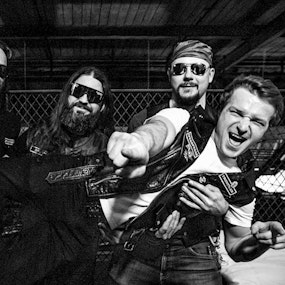
SpeedFreak
Chicago Metal quartet Speedfreak is an institution in the city’s hard rock and metal scene. With a sound that ranges from combative thrash riffs to boozy and bluesy sludge grooves, Speedfreak promises to be the cause of your next hangover. Lauded by Dee Snider as “having great songs” and “f*cking fearless”, the Chicago four-piece has a resume to match their intensity, having played at top notch venues such as Metro, Double Door, Reggies, Chop Shop and The Forge and opened for acts like Helmet, Crowbar, Mothership, Texas Hippie Coalition, Raven, Kill Devil Hill, and Shadows Fall.
Featured Episodes
Here are some great episodes to get started with


















